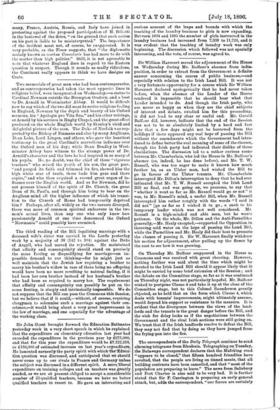Two memorials of great men who had been contemporaries, and
as contemporaries had taken the most opposite: lines in religious belief, were inaugurated on Wednesday,—a statue to Cardinal Newman outside the Brompton Oratory, and a bust to Dr. Arnold in Westminster Abbey. It would be difficult now to say which of the two did most to revive religious feeling in England, Newman by the depth and beauty of his Oxford sermons, his "Apologia pro Vita Sea," and his other writings, or Arnold by his services in Rugby Chapel, and the great effect produced on the whole English world by Stanley's vivid and delightful picture of the man. The Duke of Norfolk was sup- ported by the Bishop of Emmaus and also by many Anglicans, Dean Lake, Lord Lingen, and others, who gave the heartiest testimony to the great Cardinal's marvellous influence over the Oxford men of his day; while Dean Bradley in West- minster Abbey bore witness to the strange power of Dr. Arnold's character and the love he had inspired in so many of his pupils. He, no doubt, was the chief of those "rigorous teachers" who seized the youth of his son, the great poet, "and purged its faith and trimmed its fire, showed him the high white star of truth, there bade him gaze and there aspire," and who thus acquired a second great organ of in- fluence over the English world. And as for Newman, did he not possess himself of the spirit of Dr. Church, the great Dean of St. Paul's, and through him bring to bear on the Anglican mind all the higher influence of which his transi- tion to the Church of Rome had temporarily deprived him P Perhaps, after all, widely as the two careers diverged, there was more of common spiritual endeavour in the two men's actual lives, than any one who only knew how passionately Arnold at one time denounced the Oxford "Newmania" could possibly have surmised.


































 Previous page
Previous page